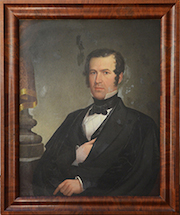 Last Sunday the film 12 Years a Slave, based on a memoir by Solomon Northup, was selected as Best Picture of 2013 by the Academy of Motion Picture Arts and Sciences. In the movie, a shopkeeper from Solomon Northup’s home town rescued him from bondage in Louisiana. But in the book, Northup was rescued from bondage by Henry Bliss Northup, a prominent Vermont attorney who was a member of the Class of 1829 at Middlebury College. The two men shared the same last name because in the late 1700s, relatives of Henry Bliss Northup had owned slaves who took the last name of their master. Solomon Northup, who was born a free man in New York, was a descendant of those slaves.
Last Sunday the film 12 Years a Slave, based on a memoir by Solomon Northup, was selected as Best Picture of 2013 by the Academy of Motion Picture Arts and Sciences. In the movie, a shopkeeper from Solomon Northup’s home town rescued him from bondage in Louisiana. But in the book, Northup was rescued from bondage by Henry Bliss Northup, a prominent Vermont attorney who was a member of the Class of 1829 at Middlebury College. The two men shared the same last name because in the late 1700s, relatives of Henry Bliss Northup had owned slaves who took the last name of their master. Solomon Northup, who was born a free man in New York, was a descendant of those slaves.
Middlebury College recently received a donation of two portraits of Henry Bliss Northup and his wife Electa Taylor Northup. The portraits were probably painted by Ezra Ames a popular artist in the early 19th century. The college is currently having the paintings restored before they become part of the Middlebury’s permanent art collection.











I think it would be very good idea for Middlebury College to provide 50 fully paid four year scholarships each year to high achieving African American high school students who come from low and middle income backgrounds.
Hmmmm. I agree.